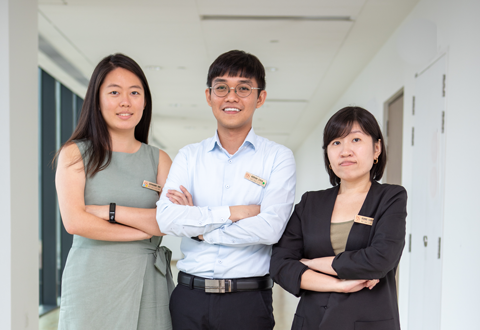
Medical research can lead to new discoveries on how to treat and prevent disease as well as improve the health of people. Over the last two decades, the National Heart Research Institute Singapore (NHRIS), has made numerous discoveries that put NHCS on the world map. From creating beating heart cells from patients’ skin, to jointly developing a kit to test for 174 genes in 17 inherited cardiac conditions, these and more are the results of our research teams’ relentless pursuits to better the lives of our heart patients.
Collaboration is key to successful teams and research projects. Have you then wondered other than our researchers, who are working behind the scenes to support these research teams? We spoke to a few of our research admininstrative superheroes from Research Administration and Development Office (RADO) - Sophrianne Yang, Huang Caixia and Adrian Chua to find out more.
What do you do at RADO?
Sophrianne: Our office provides administrative and operational support to our researchers which follows closely to the process cycle of a research study – from helping the research team in securing funds and manpower to kick-start their study, managing the operations of NHRIS where the researchers operate from, to tracking and reporting of performance indicators.
Caixia: There are presently about nine research teams working on various studies simultaneously. Most of them work in the laboratories while some are desk-bound. The amount of research equipment and materials are extensive so we would have to help with inventory and resource management.
Adrian: Each of us in the department provide different support to the research teams so some of us may handle more grant management related work while another may be more involved in running the laboratories. Our roles are also rotational to encourage exposure to different things.
How do you help research teams get the funds they need?
Sophrianne: Securing a grant is usually the first step before the start of a research. An extensive amount of time is spent on managing grants which include pre-grant calls and post-grant management. The former involves the rollout of grant calls to staff and then, the review of each application for final submission. Post-grant management requires close monitoring of the fund utilisation to ensure that the monies are spent on a timely basis and according to the terms and conditions of the grant.

Ensuring that all the information in grant applications are comprehensive and accurate before they are submitted by the research teams is one of the key responsibilities of Sophrianne and Adrian.
Adrian: There are also specific requirements to meet for each grant. The review process typically involves thorough checking of the application, information gathering and fact-checking with different departments such as Finance on budgetary issues and Human Resources for manpower concerns. All these have to be confirmed with the various stakeholders and researchers before we hit the submit button.
Caixia: There are certain peak periods with several grant calls happening within the same period and there are others which are on adhoc basis or open throughout the year. On average, we handle two to three grant calls a month.
What do you have to do when you mentioned “running of the operations of NHRIS”?
Caixia: It can be quite challenging for different groups of research teams to be working in the same space and sharing the same resources. In order to allow the researchers to focus on their core work, RADO helps to manage the day-to-day running of the laboratories. For instance, if there is any issue with an equipment, the researcher can give us a call and we will follow up with Biomedical Engineering department on the necessary repair work.

Managing the inventory at NHRIS is part and parcel of Caixia’s job.
In addition, when there is a refurbishment or renovation project, we will facilitate and coordinate with the parties involved on the needs from different teams (such as space or equipment).
Which parts of your job has brought the most fulfilment?
Adrian: The grant application review process. When I am able to offer useful inputs and help the researchers put forth a more comprehensive application, it helps to increase their chances of being awarded the grant. Being able to add value in this way is important to me.
Sophrianne: I can still recall how daunting it was for me when I first saw a research agreement (a legal document that is required for collaborative studies). It had seemed impossible to understand the document with the technical terms and jargons. However, my perspective has changed over the years. I realise that as I work on it more and always consider the interest of NHCS, I am able to grasp better and be good at it.
Caixia: I used to be a researcher so I can appreciate how challenging the research journey can be - the daily running of tests and performing analytical work are already overwhelming without the myriad of administrative tasks. Being able to offer support to the research teams is what makes our work in RADO meaningful.
What’s next for the department?
Sophrianne: The Human Biomedical Research Act (HBRA) was enhanced last year and there is now greater emphasis on getting informed consent from patients especially when they are recruited for clinical trials. It is important for us to better understand the Act and explore how we could support our research teams to ensure compliance to the regulations. With this, we hope to help our teams identify possible gaps through internal checks and establish proper documentation.
The trio also shared that the department is always looking at ways to expand their scope of work to better support the research teams. It is little wonder that a number of RADO staff have been nominated for SingHealth Duke-NUS Research Appreciation Awards in recognition of their support to research – Thank you our Research Admins, we really can’t do without you!













 Get it on Google Play
Get it on Google Play